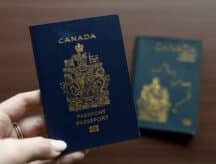If I gain Canadian permanent residence, do I have to become a citizen?
This year, Canada will welcome 465,000 new permanent residents —a record-breaking annual immigrant intake that is only likely to increase in coming years, as the country’s immigration levels plan indicates.
Furthermore, data from 2021 indicates that nearly four out of five eligible permanent residents will pursue Canadian citizenship. With such a sizeable influx of new immigrants and future Canadians, many will have questions about the conditions and responsibilities of their newfound permanent residence (PR) status.
Discover if You Are Eligible for Canadian Immigration
While Canadian permanent residents are afforded most of the same rights as Canadian citizens, they are still technically nationals from other countries. You do not have to become a Canadian citizen if you currently have PR status. However, permanent residents are subject to conditions on their status in Canada, as well as potentially facing implications from their home country when pursuing Canadian citizenship.
How is permanent residence different from citizenship in Canada?
A permanent resident is someone who has been granted the opportunity to live and work in Canada permanently. On the other hand, a (naturalised) Canadian citizen has gone through the process of meeting eligibility requirements, applying, and being recognised as a citizen by the federal government.
The primary differences between permanent residents and Canadian citizens include the following:
- Permanent residents are not allowed to vote, hold public office, or work in jobs that require specific security clearances;
- Permanent residents must reside in Canada for at least 730 (non-consecutive) days within a five-year period, or else they risk losing their permanent residency status;
- If sponsored by someone, permanent residents may not have access to certain government services unless the sponsor reimburses the costs;
- Permanent residents have different travel requirements compared to Canadian citizens; and
- Permanent residents possess different travel documents and travel privileges.
Conditions of permanent residence
While permanent residents do not have to become Canadian citizens, there are certain conditions that they must meet to maintain their permanent residence status in Canada. Namely, a permanent resident must reside in Canada for at least 730 days within the span of five years. This time does not have to be continuous. You can use the Immigration Refugees and Citizenship Canada (IRCC) travel journal template to better organise a record of your travels.
Note that one’s PR status does not expire at the same time as their PR card.
Potential implications of pursuing citizenship
One of the biggest reasons that people choose to remain Canadian permanent residents (instead of pursuing citizenship) is due to their home country not having a dual citizenship provision. This means that many people must choose between their original nationality, and a new Canadian passport.
This change can have wider implications for an individual than simply the color of their passport. Depending on their home country’s laws, they may see an impact to:
- Their ownership rights in their home country, especially around larger ownership like commercial property or businesses;
- Their ability to visit their home country (and further, their friends and families) to the same degree of freedom;
- Their access to personal and professional opportunities in their home country, including political, social, and economic prospects; and/or
- Other aspects of their personal and/or professional life.
As such, it is often a good idea to review and fully understand the implications of your decision, and even employ the help of an immigration lawyer, if you choose to move from Canadian PR, to citizenship.
Does my country allow for dual citizenship with Canada?
Below is a list of some of the top source countries of new immigrants to Canada, with a description of whether their citizens are allowed to pursue dual citizenship with Canada. If your country is not listed here, it is advisable to consult your government or relevant consulate’s webpage to learn more.
- Afghanistan: Dual citizenship is not legally recognised in Afghanistan. If local authorities in Afghanistan consider you an Afghan citizen, you may be denied Canadian consular services. However traditionally in practice, dual citizenship can be obtained by Afghan citizens, with little to no discrimination to the individual holding two passports. Notably, these individuals are not allowed to hold political office in Afghanistan without renouncing their second citizenship.
- China: Dual citizenship is not legally recognised in China. If you are detained in China, and considered a citizen by local authorities, they may refuse to grant you access to Canadian consular services, preventing the Canadian government from assisting you. Children born in Canada to at least one Chinese citizen parent may be considered Chinese citizens according to China's Nationality Law, potentially leading to them not being recognised as Canadian citizens; in addition the family may be subject to family planning regulations.
- France: French citizens are allowed to hold dual citizenship with Canada. There is no law in France that prohibits French citizens from accepting citizenship from another country. Further French nationals are under no obligation to declare this second citizenship to the French government.
- India: It is not permissible to have dual citizenship in India, according to the Indian Citizenship Act of 1955. It is further considered an offence to apply for, hold, or obtain an Indian passport after acquiring foreign citizenship. Indian nationals who become Canadian citizens are not eligible for dual citizenship.
- Iran: Iran does not formally recognise dual citizenship with any other country. If a naturalised Canadian citizen of Iranian decent wants to travel back to Iran, they will have to do so with their Iranian passport. Further these individuals may be denied Canadian consular services if detained in Iran.
- Nigeria: Nigeria allows dual citizenship with other countries and permits Nigerian nationals to hold a Nigerian passport while being naturalised to another country. However, foreign nationals who have naturalised into another country cannot naturalise to Nigeria. Nigerian nationals pursuing Canadian citizenship can hold two passports.
- Pakistan: Pakistani nationals living abroad cannot have dual citizenship. Though Pakistan has dual citizenship agreements with 19 countries, including Canada, Pakistani citizens who naturalise to another country must give up their Pakistani citizenship (this is also the case for those who become naturalised citizens of Canada).
- Philippines: The Philippines allows dual citizenship with Canada. Filipino nationals who have been naturalised to other countries can apply to retain or regain their Filipino citizenship if they were born before 1973 and had at least one parent who was Filipino at the time of their birth. Individuals born in Canada with at least one Filipino parent will already be considered dual citizens. Filipino nationals applying for Canadian citizenship can retain both passports.
- Syria: Dual citizenship is recognised under Syrian law, meaning that a Syrian national can hold dual citizenship with Canada as well. Under Syrian law, these individuals will, however, be treated as Syrian citizens first and foremost—meaning that consular services may be denied if a dual citizen is detained in Syria.
- U.S.A: The United States allows dual citizenship with other countries, including Canada. U.S. nationals can freely pursue Canadian citizenship without any impact on their American nationality.
- Do you need Canadian immigration assistance? Contact the Contact Cohen Immigration Law firm by completing our form
- Send us your feedback or your non-legal assistance questions by emailing us at media@canadavisa.com







